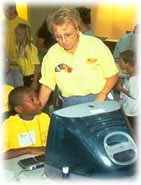|
|
|
SUVA: Fiji's political crisis has forced the University of the South Pacific to fast-track its regional education programmes based on satellite technology - but many staff and students are questioning the change. Some fear that multi-modal - or flexible learning - may erode face-to-face teaching. Others question whether the university is properly prepared with resources and staff since the F$13 million USPNet 2000 communications upgrade launched earlier this year. But acting director of extension studies Richard Wah told Wansolwara there was a problem over the "mindset" of some staff detractors. He said USP needed to move to multi-modal teaching "for its survival" in the face of increased competition from foreign universities seeking to set up their campuses in Fiji and the region. "In the past USP has enjoyed a monopoly in tertiary education in the region. But the monopoly is starting to break down," he said. Rivals include Central Queensland University which has a three-year-old campus in Fiji and Massey University from New Zealand. Both have strong distance education expertise. Since the mid-year political crisis, university has dramatically upgraded its multi-modal course offerings by extension, including: * Face-to-face teaching on campus or via USPNet video conference facilities * Print materials supplemented by audio and video support. * Web-based courses taught via the Internet. Outgoing Vice-Chancellor Esekia Solofa said the transition was in line with the university's strategic plan to serve the region by using new technology to offer tertiary educational services to the 12 member countries. "The move to put more courses on extension through a number of modes that students can choose is a way we are heading in terms of the future," he said. "This policy is set out in the strategic plan and the university isnšt going to turn away from that," Mr Solofa said the process had been "accelerated" after the coup because many regional students were unable to return to Laucala campus for the second semester. One hundred and seventy students from Samoa missed out, along with Solomon Islands (174) and Tonga (43) students. University authorities said 1141 students had been forced to take courses by extension in the second semester, totalling 2646 of the total roll of 4643 students at Laucala campus. However, Mr Solofa said this situation would be more flexible next year. But staffing and resource constraints would be a major factor. Mr Wah said there had been wide consultation within the university academic community about the shift from dual to the multi-modal teaching. He added that USP had an advantage over rival universities with its USPNet infrastructure. No other institution in the region could offer a direct link and tuition costs were much cheaper. In an open forum held last month with the vice-chancellor and his administration, senior lecturers and heads of schools expressed their disapproval about transferring on-campus courses to extension. Head of the School of Pure and Applied Sciences (SPAS), Fr John Bonato, told the forum that his department was totally committed to distance learning but did not see the possibility of offering their courses by extension. "The science and maths degrees given at USP are high standard ones because students come here to be placed in a scientific environment where they see real top-standard laboratories, interact with as many staff they wish and their laboratory programmes are integrated with their theory work right throughout the year," he said. "We cannot see this made possible by distance learning if we adopt this next year or the very near future." The head of the School of Social and Economic Development (SSED), Dr Imam Ali, also that his department would like to see the retention of on campus courses as much as possible.. |


